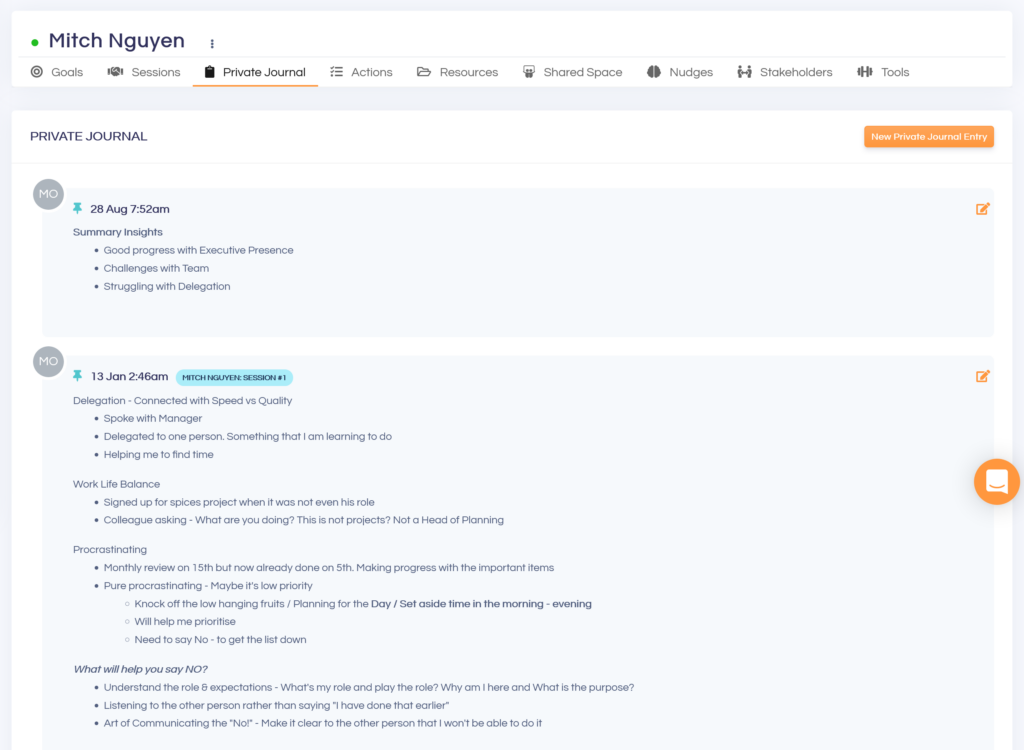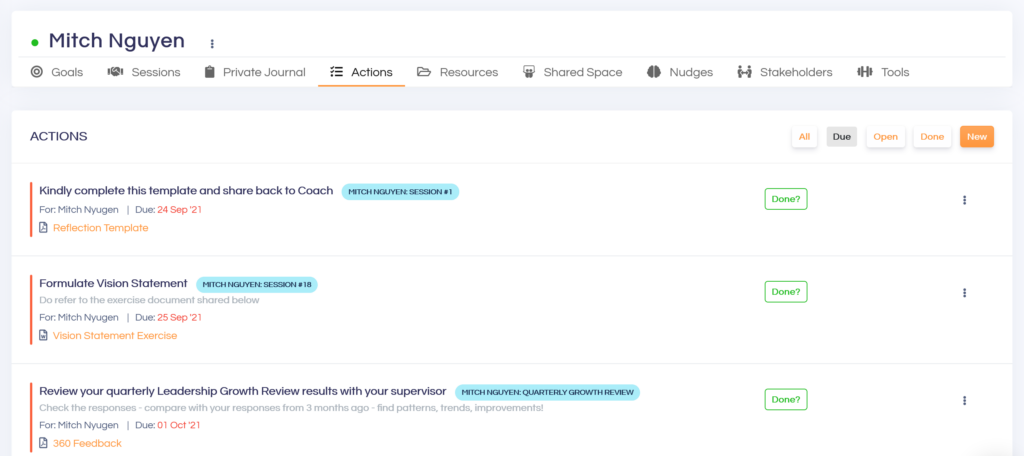As a business coach, your job is to provide the best training methods, guidance, and advice that help a wide range of executives (anyone from top-level C suite leaders to entry-level employees) develop, upgrade, and improve their knowledge and skills that will deliver transformative outcomes not just to their career but also to their business.
So, how can you structure a business coaching session that will help your client achieve those results? Let’s find out.
Stage I: The Warm-Up
a. Connect with your client at the start of the session
As with any venture, make sure that your business coaching process begins well! If it is the very first meeting between you and your client, you can offer them a free business coaching session to break the ice – almost like a precursor to the actual coaching journey. Not only will this establish your trustworthiness as a professional but will also let them gauge your competency as a coach as well.
And even if you already have an agreement in place for the business coaching program, building a good rapport with your client right at the start of your business coaching session not only instills a feeling of trust and comfort in them but also relieves any tension, stress or doubt that might exist.
As a coach, good oratory skills (which include your tonality and usage of the right vocabulary) are important in putting your client at ease and setting the course of the business coaching session right.
b. Understand your client’s mindset
After delivering your opening remarks, make sure you involve your client in the business coaching session right at the outset. You can do this by asking a few questions to gauge the client’s thought process and attitude.
The answers can provide a good lead-up towards involving the client in a two-way dialogue about idea generation, core business objectives & challenges, and their inputs on solutions to achieving those goals. Also, it will let you make the most effective use of the time available in the session.
Stage II: The Step Forward
a. Identify the business coaching topics & define a clear outcome
Now that you have your client’s attention, move on to the next step of employing your tried and tested business coaching techniques that you know will deliver effective results. Keep in mind that the very intent of structuring a business coaching session is to deliver positive outcomes to both your client and their business.
So, while you need to let the session progress naturally, make sure to identify a specific objective and a well-defined positive outcome right at the beginning of the business coaching session so that the meeting is focused on that objective only and doesn’t deviate from the issue that needs to be addressed.
For example, if your client is the CFO of a company and their specific challenge is to try and improve their profit margins in the next financial quarter, focus on that set goal and encourage your client and their team to brainstorm on what measures need to be taken to achieve that result.
b. Plan effectively to maximize available time
A business coaching session is bound by time constraints. Both the coach and client are presumably busy, so the responsibility to make the most of that session lies with both the coach and the coachee. That said, as a business coach you need to arrive well-prepared with a structured plan that focuses on the core objective. The client can pitch in by preparing a list of areas that need improvement.
By having a clearly defined plan that sets the direction of the business coaching session, you are maximizing the use of the limited available time, effectively. Of course, there might be instances where unplanned topics do crop up during a discussion, but keep your eyes on the ultimate goal and you will end with a largely productive session.
c. Begin the actual coaching
As a business coach, your main role is to be a guide and supportive partner to your client. Your task is to provide them with the tools that they require to identify their problem areas, work out a solution and achieve the results that they desire.
As a coach, don’t try and squeeze too many things into a single session, instead try and adopt a simple approach that will guide your client in exploring out-of-the-box thinking to come up with innovative ideas and answers to their obstacles.
Also remember, you are there to steer your client in the right direction but not to spoon-feed the solutions. So, encourage independent problem-solving and goal achieving that allows the client to take ownership of the action plan rather than projecting your pre-determined outcomes.
Stage III: The Wrap-Up
a. Identify key findings & insights
Now that the business coaching session is almost at its end, the final step is to summarize the takeaways from that session. This wrap-up review of the business coaching session is important as it lets the client mull over the entire session and its outcomes while it is still fresh.
This helps to not just retain the knowledge but can also be essential in aiding transformative results down the road. (Btw, Simpy.Coach integrates Private Journal as part of the coaching journey for both the coach and the client, independently, to reflect on and jot down their thoughts and learnings after a session!)
You can encourage your client to reflect on the key findings & insights that they have derived from the session by asking pertinent questions. For example, if the client’s goal is to boost profit margins for their team for the upcoming quarter, ask if the ideation & brainstorming resulted in throwing up a roadmap to increase revenue for that quarter.

b. Assign accountability
Those who generally take part in business coaching sessions are rather busy, so the chances of them forgetting a lot of the discussion from the session is high. To counter that, ask them to jot down the takeaways from the session not only because it will be important for any action steps that need to be implemented, but also to encourage the client to take accountability for their own progress.
As a professional, experienced, and qualified business coach you will always be in great demand, especially one who can bring a distinct approach to their coaching process and is successful in steering the business coaching sessions in the desired directions. These 3 stages of warm-up, step forward & wrap-up will ensure a proper structure toward that desired result.

To conclude, consider that a particular coaching session structure will only work when it is driven by the requirements, characteristics, position in the company hierarchy, and the type of industry of those being coached. As a coach, refrain from projecting your inputs or desired results, instead let those being coached take ownership of their objectives, challenges, and solutions.
So, whether you are guiding a group of entry-level executives to improve their half-yearly performance & commitment to teamwork or coaching the senior management in best leadership practices, remember to incorporate the Goldilocks principle: “not too much & not too little” – for getting things “just right” – in a business coaching process scenario.
And although most coaching sessions share some commonalities, a well-structured & well-prepared business coaching session that exudes a confident, innovative approach and interactive style will surely help in not only establishing your credentials as a great coach (word of mouth publicity is super effective) but will also be ultimately beneficial in widening your client reach and scaling your business.
After all, one single step forward is the key to larger success!
FAQs
1. How do I prepare for a business coaching session?
As a professional business coach, keep in mind these important tips on how you can prepare for a coaching session:
- Plan out your entire session, with topics, at least one day in advance
- Make sure you are well-rested and refreshed for the coaching day ahead
- Schedule your coaching assignments smartly, leaving enough time between two appointments to prepare for your next session
- Organize your coaching material in advance – notes, audio/video presentations, etc.
- Cultivate a habit of taking notes during & after a business coaching session
- Set definitive objectives for the session to avoid time wastage
- Turn off your phone during a session; nothing screams unprofessional like personal interruptions in front of a group of business executives
- Follow up with your client after a business coaching session via email or chats. This indicates interest and concern for your client’s progress
2. How do I conduct a business coaching session?
There are some simple but specific steps that you, as a business coach, can take to ensure a well-defined business coaching session structure
- Present a confident, friendly face to your clients. Make use of your oratory skills by incorporating voice modulations and apt tonality to catch the attention of your clients right at the start of a session
- Make sure the focus of the session remains firmly on your client’s issues & requirements
- Always formulate specific objectives to be covered during a session
- Guide your client through the process but let them take ownership of the actions required
- Summarize the takeaways, discuss what was learned in the duration of the session
- Assign homework; this will transfer accountability to your client to work on the action steps agreed upon
- Make sure you ask for feedback, not just on the session but on your coaching approach as well. This will enable you to assess what is working and what needs to be improved during the coaching process and make changes in real time.
About Simply.Coach
Simply.Coach is an enterprise-grade coaching software designed to be used by individual coaches and coaching businesses. Trusted by ICF-accredited and EMCC-credentialed coaches worldwide, Simply.Coach is on a mission to elevate the experience and process of coaching with technology-led tools and solutions.

Writer
An avid reader with love for books on history, sci-fi and popular fiction, Pallavi is a gifted content writer. She is also a keen listener of Indian semi & classical music. Currently, she juggles her duties of being a full-time mom with part-time content writing.









